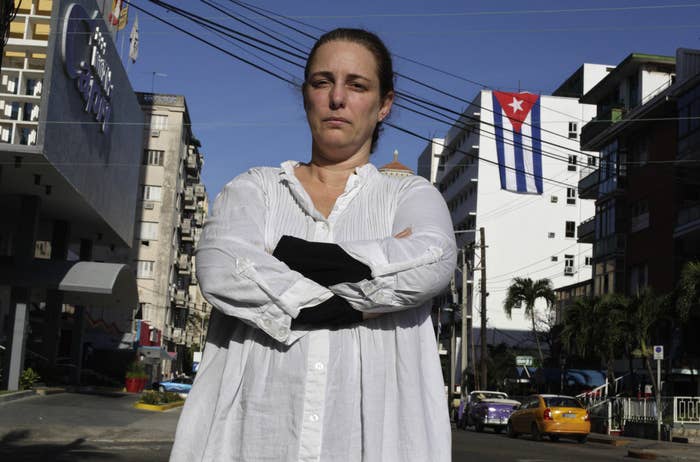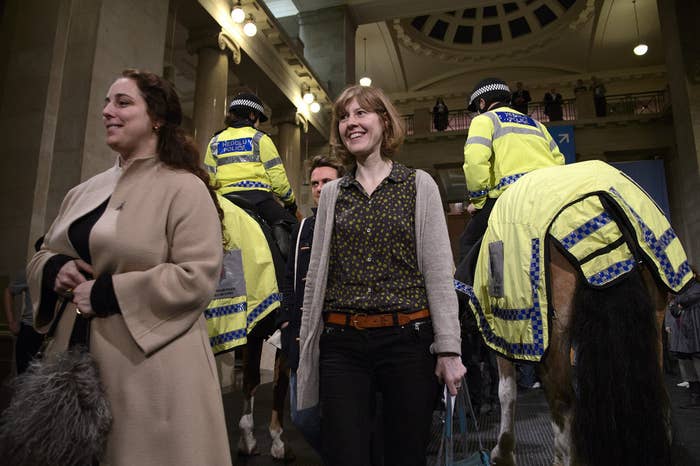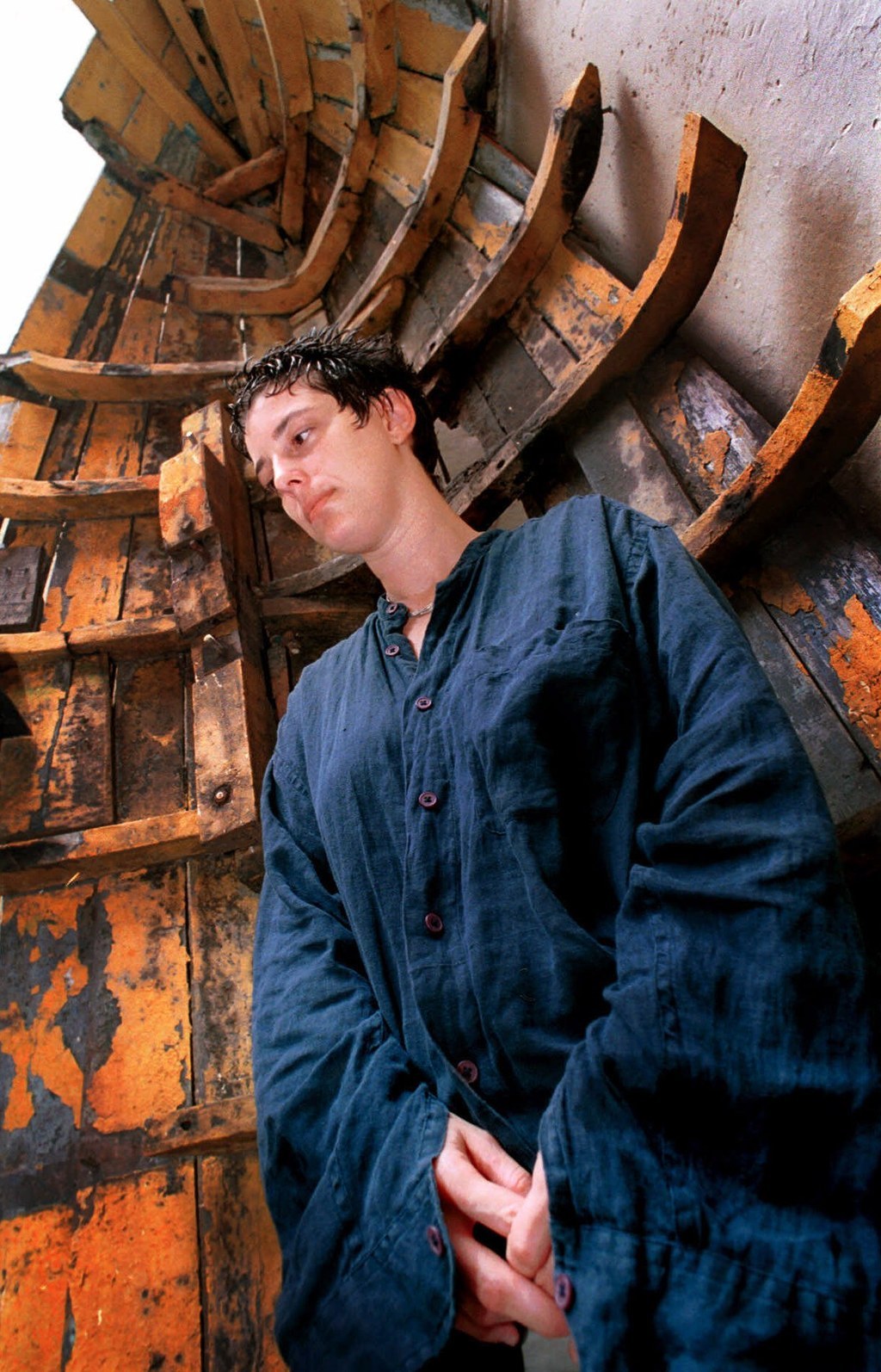
The other day, Tania Bruguera wanted to call her sister. She assumes her cell phone is tapped, so she went out into the streets of Havana with a calling card and found a pay phone. As she spoke, a group of men sidled up nearby, apparently listening. She moved to a different pay phone, and soon enough the men followed.
"Right now, I feel imprisoned," Bruguera told BuzzFeed News in Spanish, speaking from Havana. "Even though I can go out into the street, I don't feel free."
Since the end of last year, Bruguera, a Cuban conceptual and performance artist, has been imprisoned — literally — three times. The first came on Dec. 30, when the Castro regime arrested her in order to prevent her from staging a performance in the Plaza de la Revolución, Havana's central square. Less than two weeks after Raúl Castro and Barack Obama announced the historic reopening of diplomatic relations between their two countries, Bruguera wanted to test what, if anything, this meant for the day-to-day lives of Cubans. So she set up a microphone in the plaza and invited members of the public to come speak their minds for one minute each. (Bruguera had set up a similar performance at the Havana Biennial in 2009 without incident.) The regime responded by throwing her in jail.
Bruguera's arrest made international headlines and instantly became grist for the debate over the U.S.-Cuba thaw. Conservative politicians and Cuban exiles used her arrest to denounce the renewal of diplomatic relations: See? The Castros aren't going to change a thing. Republican Senator Marco Rubio, who recently announced his run for president, said in December that Bruguera's arrest made "a mockery" of Obama's decision to open diplomatic relations. Never mind that Bruguera was in favor of the thaw, and that her political views are far to the left of your typical Cuban-American exile.
Tuesday, just days after Obama and Castro met in Panama in the first significant encounter between the two countries' heads of state in more than a half century, Bruguera remains in Cuba, her passport confiscated, waiting to find out whether the government will bring criminal charges against her.
"I think it's a very intelligent move on their part," Bruguera said. "They wish that I were in prison, but that would probably cause too much of a scandal. So it's better like this."

Before her arrest, the 47-year-old Bruguera lived mostly in New York, where she runs an immigrant community center-cum-art project in Queens. But she always maintained strong ties with Havana, where she is now living in her mother's house. On 16 different occasions over the last two months, a female lieutenant colonel from Cuba's ministry of the interior has showed up, in uniform, and demanded that she come outside for an interrogation. Bruguera has no choice but to oblige.
"I'm not technically free. I'm waiting for a decision from the prosecutor, so I have to do what they say," Bruguera said. "At first she would show up and I would have to come out running right then and there. It's a form of psychological pressure — they want to make clear that they can do whatever they want with you. A lawyer told me I had the right to be notified 24 hours in advance, but they get angry at you when you claim your rights. It's almost comical."
Every time, the lieutenant colonel puts Bruguera in the backseat of a car, squeezed between two men, and drives her to a small house. There, government officials sit her down and bombard her with questions and accusations: She's part of the CIA, she's funded by USAID, she has extensive ties to far-right terrorists in Miami. Once she tried to sit in a different place, but they wouldn't let her, which she took as a sign that she was being secretly videotaped.
The interrogations are easy, though, compared to the misinformation campaigns, the character assassination, the slow social isolation the regime has submitted her to. Most recently, there have been rampant rumors that Bruguera is a drug addict — a cokehead, specifically. She suspects this arises from the fact that, during a performance in Bogotá in 2008, she had a waitress walk through the crowd offering lines of cocaine as part of a commentary on the drug's role in fueling Colombia's civil war. Thanks to the regime, she said, many of her former friends have abandoned her.
"It's gotten to the point where I feel alone," she said. "I feel very, very, very alone. All of the people I thought were friends are, it turns out, not really friends. There's no one I can talk to about my private things, there's no one I can trust. It feels like me against the world."
Above all, she said, the regime has done everything possible to associate Bruguera with the most recognizable international face of opposition to the Castros: the conservative exile community in the U.S., whom the Castro regime have long called gusanos, or worms. In a sense, this has been easy. After her arrest, the exilio took up Bruguera's cause with great enthusiasm, as did the Republicans who owe their jobs to decades of Cuban-American political influence.

But Bruguera's intention with the open-mic piece was not to denounce the diplomatic thaw, or even necessarily to denounce the regime. Rather, it was to envision what it would be like if the tone that Cuba had suddenly struck with the U.S. — "we can coexist despite our differences" — applied between Cuba and its people. The selection of the Revolution Square, the historic site of Fidel Castro's marathon speeches, was obviously symbolic.
"Whenever we go to the plaza, we go listen to them," Bruguera said. "It would be nice if they listened to us for a change."
Nevertheless, Bruguera has become an unwitting hero of the exiled right. "It's an easy way to discredit someone," Brugera said. "There are many people in Cuba who have legitimate criticisms who abstain from voicing them in public, specifically because they're afraid of getting lumped in with the right." It's a defense by absolutism: "You can't criticize one thing without criticizing everything else."
Unlike in the U.S., much of Latin America doesn't see the Cuban revolution as an abomination. Bruguera, who grew up on the island as the daughter of a diplomat, is a believer in the revolution's promise. Her chief complaint against the Castros is that they betrayed that promise.
This may be why the regime treats the performance artist so harshly. Her views cannot be easily dismissed as the counterrevolutionary rants of the gusanos, and yet she refuses to stand with the leftist apologists who refuse to acknowledge the regime's brutality — or the island's crushing inequality.
Bruguera worries, for example, that Cuba's economic liberalization will propagate a tiny ruling class and disenfranchise the rest. "Right now, the most defenseless people in Cuba are the ones who sacrificed everything to the revolution, the ones who spent their lives in a factory or in the cane fields or as teachers," she said. But these people are not the ones starting businesses in Cuba's new private sector, she said, nor will they enjoy its benefits. It's the retired members of the regime and the exiles in Miami who are poised to make a killing.
"In five or ten years, this country is going to look exactly like the Dominican Republic," she said.
For now, Bruguera will have to keep navigating life as an enemy of the state. "The most difficult part is avoiding falling into the trap of becoming a victim," she said. "Otherwise you get used to the worst. I have to keep understanding that the things that are happening to me are not normal, or there might be a sort of Stockholm syndrome. The great battle now is making sure that I don't get used to this."
